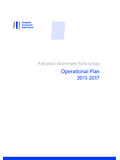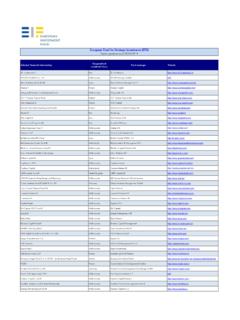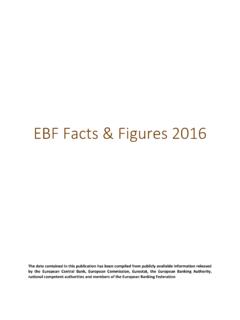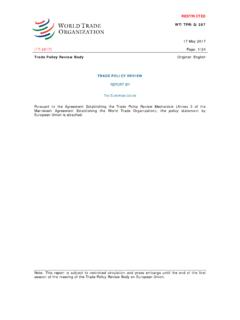Transcription of SF AP FINAL FINAL - responsible-investor.com
1 EN EN EUROPEAN COMMISSION Brussels, COM(2018) 97 FINAL COMMUNICATION FROM THE COMMISSION TO THE EUROPEAN PARLIAMENT, THE EUROPEAN COUNCIL, THE COUNCIL, THE EUROPEAN CENTRAL BANK, THE EUROPEAN ECONOMIC AND SOCIAL COMMITTEE AND THE COMMITTEE OF THE REGIONS Action Plan: Financing Sustainable Growth 1 Setting the scene By adopting the Paris Agreement1 on climate change and the UN 2030 Agenda for Sustainable Development2 in 2015, governments from around the world chose a more sustainable path for our planet and our economy. The UN 2030 Agenda has at its core 17 Sustainable Development Goals (SDGs). Over the next 15 years, these goals will guide us in preparing for a future that ensures stability, a healthy planet, fair, inclusive and resilient societies and prosperous economies.
2 The Paris Agreement, signed in December 2015 by 195 countries, is the first-ever universal, global climate deal to adapt and build resilience to climate change and to limit global warming to well below 2 C. Sustainability and the transition to a low-carbon, more resource-efficient and circular economy are key in ensuring long-term competitiveness of the EU economy. Sustainability has long been at the heart of the European Union project and the EU Treaties give recognition to its social and environmental The EU is committed to development that meets the needs of present and future generations, while opening up new employment and investment opportunities and ensuring economic growth.
3 Many of the Commission s priorities4 for 2014-2020 feed into the Union's energy and climate goals and work towards implementing the UN 2030 Agenda for Sustainable Commission is also working on a Reflection Paper 'Towards a Sustainable Europe by 2030' and has launched a multi-stakeholder platform to exchange best practices on SDG implementation. As we are increasingly faced with the catastrophic and unpredictable consequences of climate change and resource depletion, urgent action is needed to adapt public policies to this new reality. The financial system has a key role to play here. The financial system is being reformed to address the lessons of the financial crisis, and in this context it can be part of the solution towards a greener and more sustainable economy.
4 Reorienting private capital to more sustainable investments requires a comprehensive shift in how the financial system works. This is necessary if the EU is to develop more sustainable economic growth, ensure the stability of the financial system, and foster more transparency and long-termism in the economy. Such thinking is also at the core of the EU s Capital Markets Union (CMU) At the end of 2016, the Commission appointed a High-Level Expert Group on sustainable finance. On 31 January 2018, the expert group published its FINAL report6 offering a comprehensive vision on how to build a sustainable finance strategy for the EU. The Report argues that sustainable finance is about two urgent imperatives: (1) improving the contribution of finance to sustainable and inclusive growth by funding society's long-term needs; (2) strengthening financial stability by incorporating environmental, social and governance (ESG) factors into investment decision-making.
5 The Report proposes eight key recommendations, several cross-cutting recommendations and actions targeted at specific sectors of the financial system. This Action Plan builds upon the group's recommendations to set out an EU strategy for sustainable finance. 1 See conclusions agreed in December 2015 at 2 3 See, among others, art. of the Treaty on the European Union (TEU) and the role of environmental and social issues in international cooperation (art. 21 TEU). 4 These priorities include the Clean Air Policy Package ( ), the Circular Economy Package ( ), the Energy Union Strategy ( ) including the Clean Energy for All Europeans Package, the EU Strategy on Adaptation to Climate Change ( ), the New Skills Agenda for Europe ( :52016DC0381&from=EN), the European Pillar of Social Rights ( ), the development of "blue economy financing principles" and the Investment Plan for Europe ( ).
6 5 6 2 1 Finance for a more sustainable world Finance supports the economy by providing funding for economic activities and ultimately jobs and growth. Investment decisions are typically based on several factors, but those related to environmental and social considerations are often not sufficiently taken into account, since such risks are likely to materialise over a longer time horizon. It is important to recognise that taking longer-term sustainability interests into account makes economic sense and does not necessarily lead to lower returns for investors. 'Sustainable finance' generally refers to the process of taking due account of environmental and social considerations in investment decision-making, leading to increased investments in longer-term and sustainable activities.
7 More specifically, environmental considerations refer to climate change mitigation and adaptation, as well as the environment more broadly7 and related risks ( natural disasters8). Social considerations may refer to issues of inequality, inclusiveness, labour relations, investment in human capital and communities. Environmental and social considerations are often intertwined, as especially climate change can exacerbate existing systems of inequality. The governance of public and private institutions, including management structures, employee relations and executive remuneration, plays a fundamental role in ensuring the inclusion of social and environmental considerations in the decision-making This Action Plan on sustainable finance is part of broader efforts to connect finance with the specific needs of the European and global economy for the benefit of the planet and our society.
8 Specifically, this Action Plan aims to: 1. reorient capital flows towards sustainable investment in order to achieve sustainable and inclusive growth; 2. manage financial risks stemming from climate change, resource depletion, environmental degradation and social issues; and 3. foster transparency and long-termism in financial and economic activity. Reorienting capital flows towards a more sustainable economy levels of investment are not sufficient to support an environmentally and socially sustainable economic system. Europe has to close a yearly investment gap of almost EUR 180 billion to achieve EU climate and energy targets by According to estimates from the European Investment Bank (EIB), the overall investment gap in transport, energy and resource management infrastructure has reached an astounding yearly figure of EUR 270 A lack of clarity among investors regarding what constitutes a sustainable investment is a contributing factor behind this investment gap and also an obstacle to financing the social infrastructure that is needed to address inequality and inclusiveness issues.
9 Transforming Europe's economy into a greener, more resilient and circular system will not just reduce our environmental footprint on the planet and address existing inequalities. It will also boost competitiveness by improving the efficiency of production processes and reducing the costs of accessing and managing resources. 7 covering air and water pollution, resource depletion, and biodiversity loss. 8 One of the four priorities for action under the Sendai Framework for Disaster Risk Reduction focuses on investing in disaster risk reduction for resilience. 9 Governance is a tool to integrate environmental and social objectives in public and private investment decisions.
10 For instance, executive compensation rules or incentives to protect shareholders' rights from managers are tools to ensure equality between the different stakeholders of a firm, managers, workers, shareholders and so on. In this case, in fighting inequality within a firm, governance performs a social goal. 10 The estimate is an yearly average investment gap for the period 2021 to 2030, based on PRIMES model projections used by the European Commission in the Impact Assessment of the Proposal of the Energy Efficiency Directive (2016), :52016SC0405. 11 See EIB, 'Restoring EU competitiveness', 2016. The estimate, until 2020, include investments in modernising transportation and logistics, upgrading energy networks, increasing energy savings, renewables, improving resource management, including water and waste.




